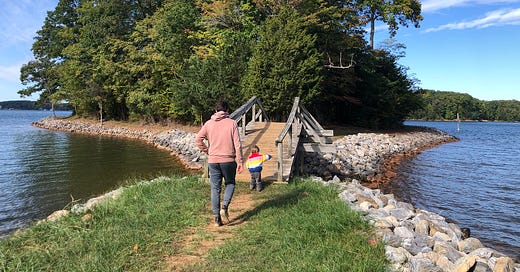We’ve returned from a lovely long weekend at Smith Mountain Lake with our dear friends and their kiddos. We ate s’mores, saw bald eagles, hiked, and talked around the campfire till late.
We’re so thankful for our community of friends and the ways they love us and our boys. We don’t deserve them.
Why I write this muddled newsletter, and why I sometimes don’t like talking about what’s on my mind:
“I always know what I want to tell but in a very confused way, so confused that I wouldn’t be able to say it even to myself. In the past, to get out of that confusion, in the urgency to express myself and understand what was going through my own head, I would talk to a friend. But I soon discovered that the spoken story took away the desire to write, and so I learned to be silent. If I want the story to move from confusion to order, I have to write: for me, there is no other way. Naturally, once the story is under way, as it moves on from the beginning and seeks a conclusion, I may discover possible links to material already written, and I use it or rewrite it. But essentially, when I write, I myself am amazed at what emerges from the fog and becomes clear, establishes connections, finds junctions. Yet I should clarify here that not even this simple movement from confusion to story has ever seemed to me sufficient. The problem for me is naturalness of tone and preserving the truth. If, in telling a story, the writing loses truth, I throw it away.”
— Elena Ferrante, in conversation with Sheila Heti in Brick
She always had a dim sense of discomfort.
“If I think today of the woman I once was, the woman with the little double chin, who tried very hard to look younger than her age, I feel little sympathy for her. But I shouldn’t like to judge her too harshly. After all, she never had the chance of consciously shaping her life. When she was young she unwittingly assumed a heavy burden by starting a family, and from then on she was always hemmed in by an intimidating amount of duties and worries. Only a giantess would have been able to free herself, and in no respect was she a giantess, never anything other than a tormented, overtaxed woman of medium intelligence, in a world, on top of everything else, that was hostile to women and which women found strange and unsettling. She knew a great deal about many things, and nothing at all about many others; all in all her mind was governed by terrible disorder, a reflection of the society in which she lived, which was just as ignorant and put-upon as herself. But I should like to grant her one thing: she always had a dim sense of discomfort, and knew that all this was far from enough.”
— Marlen Haushofer, The Wall
Feminist rage, consider yourself reignited.
“We don’t live in birth long enough to see it for what it really is: a system built in tandem with a profession founded on fear of the generative power of the birthing body. Obstetrics is a specialty constructed in the belief that Black pregnant bodies tolerate more pain and are predisposed to disease, while white pregnant bodies’ frailty requires expert control—medical arts, tools, drugs. The profession is highly skilled while simultaneously hamstrung by hospital systems for which maternity services turn the heftiest profit. Every birth is a manufactured healthcare crisis only doctors with rigid protocols in multi-million-dollar hospitals can solve. It is a system that has evolved to control women for money.”
— Allison Yarrow, Birth Control
What if Christianity is not water? What if it’s a clearing in a forest?
Christianity is often imagined as water. “But let justice run down like waters, and righteousness like an ever-flowing stream”: the words of Amos 5:24, repurposed by Martin Luther King Jr. “He who believes in Me,” promises Christ, “out of his heart will flow rivers of living water.” Water baptizes, gives life, quenches thirst, purifies filth, expunges flames, transforms things for the better. If Christianity is water, then it is an unstoppable force: It will run down and seep up, no matter the impediment.
But what if Christianity is not water? What if, instead, we understand the Christian era as a clearing in a forest? The forest is paganism: dark, wild, vigorous, and menacing, but also magical in its way. For two thousand years, Christians pushed the forest back, with burning and hacking, but also with pruning and cultivating, creating a garden in the clearing with a view upward to heaven.
But watch as roots outstretch themselves and new shoots spring up from the ground. The patch of sky recedes. “Paganism has not needed to be reinvented,” writes Steven Smith: It never went away. “In a certain sense, the Western world has arguably always remained more pagan than Christian. In some ways Christianity has been more of a veneer than a substantial reality.”
With no one left to tend the garden, the forest is reclaiming its ground.
— Louise Perry, “We Are Repaganizing,” First Things
Currently Reading
Milk Tongue, Irène Mathieu
Joie, Ajiri Aki
The Song of Significance, Seth Godin
Birth Control, Allison Yarrow





